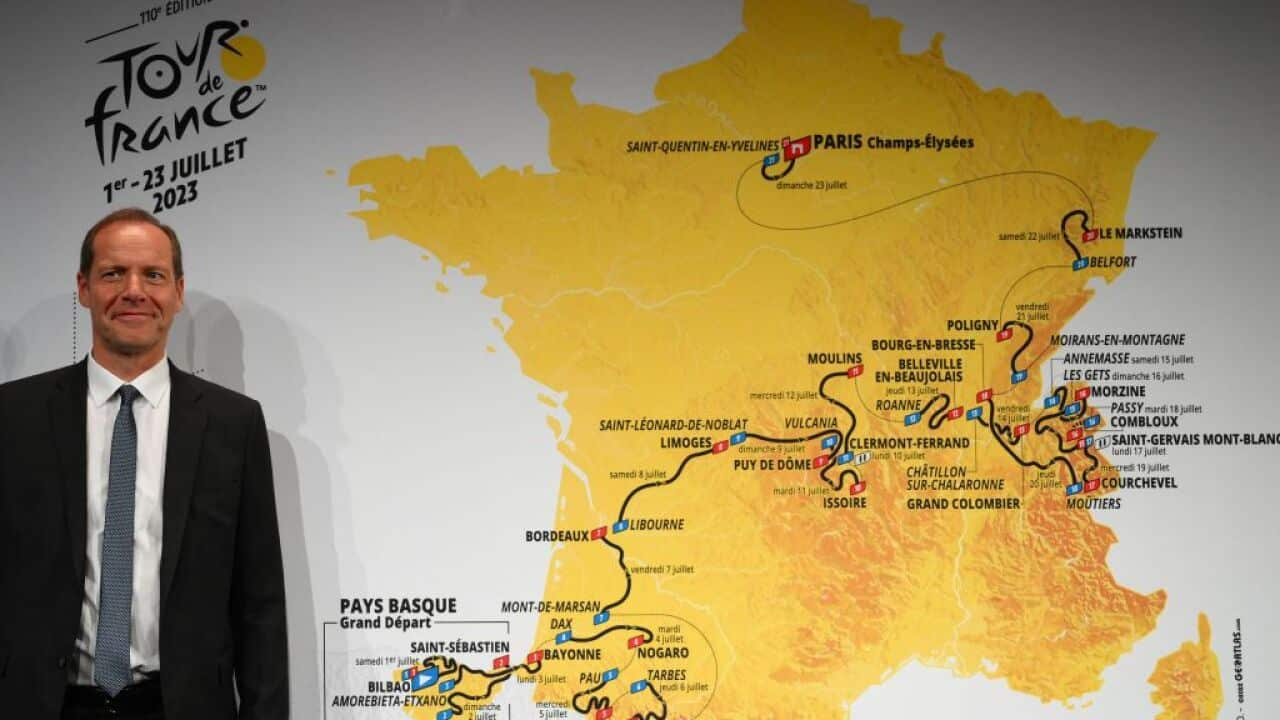Tour de France Femmes
Following on from a triumphant return last year, the route of the second edition of the Tour de France Femmes was first to be revealed, with eight stages and 956 kilometres of total racing awaiting the women's peloton.
Organisers have made a variety of interesting changes to the event, as the women won't depart from the Champs-Élysées following the conclusion of the men's race this year, instead setting off from the town of Clermont-Ferrand on July 23.
From there the route takes more of a focus on climbing, as the riders head towards the mountains in just the second stage with 2,500 metres of elevation and six categorised climbs on the agenda before the finish in Mauriac.
The Femmes' peloton faces an epic conclusion with Stage 7 featuring the iconic Tourmalet climb for the first time before the final stage sees riders take on a 22-kilometre individual time trial around the city of Pau.

The route for the 2023 Tour de France Femmes avec Zwift. Source: SBS
"It's a serious climb, but we've seen the women can handle that," she told Christophe Mallet and David McKenzie as the trio watched the presentation unfold.
"[The Tourmalet] will absolutely divide and blister the peloton and will also impact the kinds of riders each of the teams will select for this second Tour de France Femmes."
The other big talking point for O'Donnell was the individual time trial to finish the women's race and how it will give specialist riders the chance to tip the scales in their favour on the final day.
"We've heard World Hour record holder Ellen van Dijk talk about how she wants to have more time trials in the UCI World Tour, and now to have one in this women's Tour de France is just fantastic," O'Donnell said of the race against the clock.
Tour de France
The men's race was unveiled next with another mountainous theme to mirror the Femmes, with 30 classified climbs for the men across the 21 stages.
The race will depart from the city of Bilbao in the Basque region in Spain, one of the most cycling-crazy areas of Europe where SBS commentators Matt Keenan and Dave McKenzie said they expect to see swathes of fans come out to cheer the riders on.
"There's Spain, and then there's the Basque country," Keenan said.
"There's two parts of the world that make a bid for being the most passionate about cycling - the Basque country and the Flemish. The Basque love a bit of miserable weather and they love the fact that the climbs are on inconsistent, narrow roads."
"Whenever there was a Vuelta stage finish or start in Bilbao, that's where the crowds were the biggest," McKenzie said.
"I'm expecting them to be ten to fifteen deep for the Tour de France."
The Spanish fans are in for a treat from the very start, as the opening stage looks to be a brutal affair with 3,300 metres of elevation in the loop around Bilbao.
After three stages in Spain, the race heads for the Pyrenees then heads north with Stage 9 set to be a highly anticipated summit finish on the Puy de Dôme (13.3km, 7.7%).
The second week sees the peloton head to the Alps, and a finish atop the Grand Colombier on Bastille Day will follow the finale on Alpe d'Huez to celebrate France's national holiday in last year's race.

The route for the 2023 Tour de France. Source: SBS
Keenan's observation of the course as a whole was its unpredictability for teams and riders.
"There's 30 classified climbs, the most they [the Tour de France] have ever had, but there's no one stage that really jumps out and you say 'that's the decisive day'," he said.
"I love the uncertainty of each stage, we don't know what the big day will be.
"The most significant thing that I take from the course design is it's almost impossible for a team to control. It's going to be a chaotic race, and that's where the entertainment will come from."


